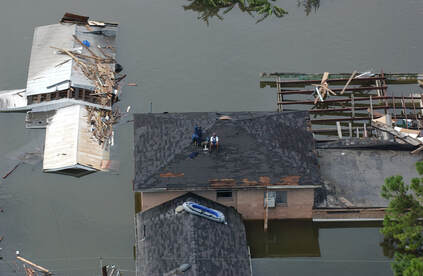
After Hurricane Katrina in 2005, I had a number of, what I now call, climate refugees in my schools in Pittsburgh. These were the children of families displaced from New Orleans, who had lost their homes and were being housed temporarily in Pittsburgh. Two students, for instance, played in my orchestra at Woolslair Elementary. Woolslair was, at the time, fairly diverse. Taking a guess, the racial make-up was maybe 45% White, 45% African American, and 10% Middle Eastern or Southeast Asian. Taking in two additional African American students didn't change the overall diversity of my ensemble much, since my orchestra then represented the school's diversity pretty well (which I had since heard is irregular in school music; as most ensembles are Whiter than the school population). Should I refer to these students as climate refugees?
What is a climate refugee? Is the phrase "climate refugee" appropriate? Certainly my students were displaced by climate change. The Union of Concerned Scientists has discussed the link between increasingly destructive hurricanes and climate change. But what is a refugee? Dictionary.com defines refugee as "a person who flees for refuge or safety, especially to a foreign country, as in time of political upheaval, war, etc." My students were definitely persons fleeing for refuge and safety, though not to a foreign country and not in a time of political upheaval, however bad the Bush years were. There was a lot of pain in the African American community, especially for the folk who were left behind by an ineffective Republican federal government. (see image of Katrina victims on a house roof). As Kanye said it, "A lot of the people that could help are at war right now, fighting another way, and they've given them permission to go down and shoot us." But my students didn't have to flee Katrina to find themselves in concentration camps, or killed crossing the border, as refugees from El Salvador and other nations have in recent months.
Eve Andrews defines climate refugees. Here are 10 important points:
- Calling those displaced by climate change "refugees" relays the sense of urgency that is due.
- It is supported by the fact that millions are being displaced by this global emergency.
- But the term "refugee" has, in recent years, increased xenophobia in the Global North.
- These richer, mostly White, countries have contributed the most to the climate crisis.
- But politicians have used climate displacement to push for protectionist policies, such as building border walls, and military action.
- The scale of the problem is overwhelming: In 2017 over 60% of displacements (18 million humans) were due to natural disasters, many of those were connected to climate change.
- The World Bank estimates there will be 150 million climate refugees by 2050.
- In most case, climate refugees haven't been able to claim asylum as refugees because of the wording of the law.
- Some have gained refugee status by using climate change as a "risk multiplier." Climate catastrophes increase war and other suffering.
- Alternatively, some experts suggest dropping the term "refugee," and to just aim to help people displaced by climate change, avoiding the problems with using the word "refugee" under international and national laws.
So, what does it mean for teachers? I cannot have been the only teacher to receive people displaced by Hurricane Katrina in 2005. My climate refugees quickly became friends with other African American students, sharing a cultural language that was familiar to me as a teacher. Integration of these children was fairly painless from what I could tell. How well did it work in less diverse schools though? As a music teacher, I told students they could talk to me about it privately, or even during class if they wanted to. I didn't initiate class discussion around it though, trying to avoid exacerbating pain for my students who were suffering from ecological and political challenges beyond their control. As always, I'm not sure I did the best I could do. If you have pedagogical suggestions, leave them in the comments.
DJS
 RSS Feed
RSS Feed
